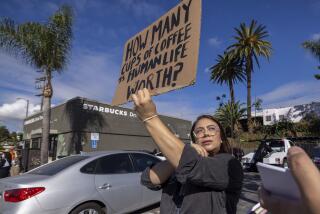NAACP to Help Southland Corp. End Disputes
- Share via
Facing charges of unfairness from black 7-Eleven franchise holders, Southland Corp. said Tuesday that it had agreed to form a task force with the Los Angeles chapter of the National Assn. for the Advancement of Colored People to resolve disputes over blacks’ dealings with the convenience store company.
Black store owners have charged that Southland--which counts 30 black-owned stores among its 650 7-Eleven stores in Southern California--has barred them from buying franchises in white neighborhoods and imposed financing arrangements that have jeopardized some owners’ ability to stay in business.
A Southland official acknowledged Wednesday that the charges were substantive. “They’re serious in nature, and we have to sit down with the NAACP to resolve them,” said Owen McKay, a community resources representative in Southland’s regional office in Anaheim. “We can’t get around that. It’s just good business sense.”
NAACP leaders outlined a broad agenda for their talks with Southland executives. The civil rights group said it would press the Dallas-based company to increase the number of blacks in top management and to purchase more products and services from minorities.
The complaints about Southland’s treatment of black store owners, however, are at the heart of the dispute.
“Our position is that the ambiguity of Southland’s franchise policies and practices may create uneven treatment of its 7-Eleven operators,” said Los Angeles NAACP Vice President Anthony Essex. “These policies should be revised to ensure that all franchisees get full and equal opportunity to operate stores in all communities, own multiple stores and sell them at a reasonable price if they so desire.”
Franchise owners have complained that a Southland policy setting strict time limits for them to purchase an 85% share in their stores worked a hardship, slicing profits and making it difficult for some to retain their ownership positions.
Experts on the company--which faced takeover threats earlier this year and is in the midst of arranging a buyout by its founder’s family--said Southland may have been tightening its financial hold on franchisees to improve the corporation’s cash-flow situation.
The NAACP is focusing on the 7-Eleven dispute, in part because franchise ownership is widely considered a key to minority economic development.
Because of the marketing and management support they receive from their corporate backers, analysts say, franchises have a much better record of success than other small businesses and thus are an attractive economic building block for minority communities.
“It bridges the experience and business-knowledge gap, which is known to be one of the major causes of low minority participation in business,” said attorney Raymond Johnson Jr., president of the Los Angeles NAACP.
More to Read
Inside the business of entertainment
The Wide Shot brings you news, analysis and insights on everything from streaming wars to production — and what it all means for the future.
You may occasionally receive promotional content from the Los Angeles Times.










